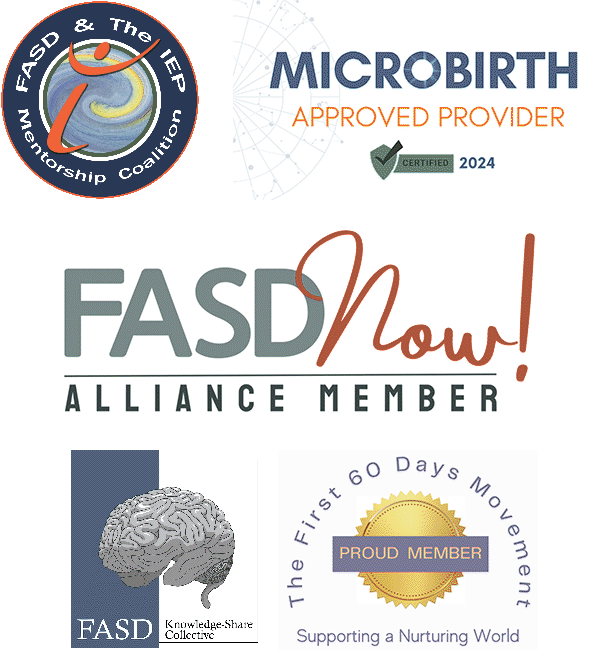How We are Born Can Have Lifelong Impacts on Our Development and Health
An introduction to the influences of the microbiome on infant and child development

A history of symbiotic development
 As long as we have existed, human beings have had a symbiotic relationship with microbes. They live around us, on us, and within us. And quite literally, without them we could not survive. Scientific research on how these microbes impact our development is teaching us about the benefits of connection to nature and the challenges that come with many modern activities and perceptions.
As long as we have existed, human beings have had a symbiotic relationship with microbes. They live around us, on us, and within us. And quite literally, without them we could not survive. Scientific research on how these microbes impact our development is teaching us about the benefits of connection to nature and the challenges that come with many modern activities and perceptions.
We tend to think of bacteria as something bad, something we should rid ourselves of for health. But there are actually many helpful forms of bacteria and other microbiota that support our physiological development and impact our biological functioning. By learning about these microorganisms and how they influence our development, we can enhance our understanding of our bodies’ interconnection with everything around us.
How do the microbes get in there?
Our bodies receive their first large dose of microbes during the birthing process. Vaginal birth is naturally designed to promote the seeding of the microbiome. This occurs through contact with vaginal secretions, the birthing parent’s skin, and their feces (yes, exposure to poop is a natural and evolutionary part of the process!). Babies born via cesarian section have a significantly different microbiome composition. While hospitals and surgical venues are intended to be sterile environments, they are not actually void of microbes, but rather have a different combination of microorganisms. The impact of an infant’s early exposure to antibiotics can also have a detrimental effect on the seeding of the gut microbiome.
Breast or chestfeeding provides a significant boon to the health of the infant’s microbiome. Human milk has many components that are undigestible by humans and are designed to feed the microbes directly. This encourages growth of healthy, helpful microbes within the infant’s digestive system. Breastfeeding has the added benefit of skin-to-skin contact which introduces additional helpful microbes to the infant’s body. These two factors not only support healthy gut, oral and skin microbiome development, they can also help to rectify the dysbiosis that occurs when babies are exposed to antibiotics early in life or are born via cesarian section (which typically includes antibiotic exposure as well).
How do the differences in infant microbiomes impact development?
 The way we come into the world impacts our long-term health. Babies born vaginally, not exposed to antibiotics, and exclusively breastfed demonstrate healthier long-term outcomes throughout their lives. Those infants who did not experience vaginal birth, who are not fed human milk, or who are exposed to antibiotics early in life, have increased risks for detriment to their immunological and metabolic functioning. Some of these alterations have an impact on gut-brain communication and neurological functioning which have influencing factors on neurodevelopmental presentation. While we are learning ways to help shift these initial transpositions of our biological functioning, we do not yet know how to remedy them fully.
The way we come into the world impacts our long-term health. Babies born vaginally, not exposed to antibiotics, and exclusively breastfed demonstrate healthier long-term outcomes throughout their lives. Those infants who did not experience vaginal birth, who are not fed human milk, or who are exposed to antibiotics early in life, have increased risks for detriment to their immunological and metabolic functioning. Some of these alterations have an impact on gut-brain communication and neurological functioning which have influencing factors on neurodevelopmental presentation. While we are learning ways to help shift these initial transpositions of our biological functioning, we do not yet know how to remedy them fully.
How does the infant microbiome relate to child development?
While the microbiome (as a whole) is only one factor influencing child development, its initial seeding and development has long term effects on human health and functioning. The repercussions of not receiving the necessary microbial combinations needed for optimal physiological functioning increases the likelihood of health impacts such as allergies, asthma, obesity, and autism. Many of these sequelae have additional ramifications that impact a child’s development. For example, a child who experiences allergies may present as colicky when very young which impacts sleep and other functions needed for healthy development. Allergic reactions can be painful and frightening for the child, resulting in traumatic experiences that impact brain development. Staying away from certain foods may influence the child’s microbial gut make-up even further. Each of these functions like a microaggression on the overall health of the child.
What can we do to nurture a healthy microbiome in children?
There are increasing numbers of studies looking into various aspects of the human microbiome and its effects on health and well-being. As we learn more about the nuances of our symbiotic relationship with microbiota, we are also learning how to mitigate dysbiosis. Scientists, physicians, healthcare professionals, birth workers and families are learning about the importance of gut, skin, and oral health and how these influence a favorable trajectory for development of the microbiome.
There are a number of ways we can promote the development of health-supporting microbes. Encouraging connection with nature has a positive impact on the microbiome, so getting outside to play – especially where there are trees and dirt – can positively impact children’s health. Eating foods high in fiber while simultaneously avoiding processed foods can also positively influence the make-up of the microbiome. Exercise has also been shown to impact our microbiome favorably. Each of these factors impact the neurological and cognitive development of children.
 By continuing to expand awareness of the unique and multifactorial impact of the microbiome on human health, we can begin to change the narrative around birth, breastfeeding, health, and even neurodiversity, to include a focus on how our bodies are integrating with the synergistic microbiota within and around us. The more we can bring these considerations into mainstream conversations, the sooner the fascinating functionality of the microbiome will become part of our social consciousness.
By continuing to expand awareness of the unique and multifactorial impact of the microbiome on human health, we can begin to change the narrative around birth, breastfeeding, health, and even neurodiversity, to include a focus on how our bodies are integrating with the synergistic microbiota within and around us. The more we can bring these considerations into mainstream conversations, the sooner the fascinating functionality of the microbiome will become part of our social consciousness.
 Kelly Rain Collin, Ed.M. is an Educational Consultant, Child Mental Health Specialist, and Microbirth Approved Provider with a passion for helping children realize their potential and access their strengths. By bridging the fields of child development, education and mental health, she is able to assist families, schools, and mental health professionals in understanding and creating supportive plans to enhance children’s developmental trajectory and address their learning and mental health needs at school.
Kelly Rain Collin, Ed.M. is an Educational Consultant, Child Mental Health Specialist, and Microbirth Approved Provider with a passion for helping children realize their potential and access their strengths. By bridging the fields of child development, education and mental health, she is able to assist families, schools, and mental health professionals in understanding and creating supportive plans to enhance children’s developmental trajectory and address their learning and mental health needs at school.
To learn more about the impact of the microbiome on infant health, we suggest this scientific article on the Role of Bifidobacteria on Infant Health and encourage you to watch the documentary, Microbirth.



